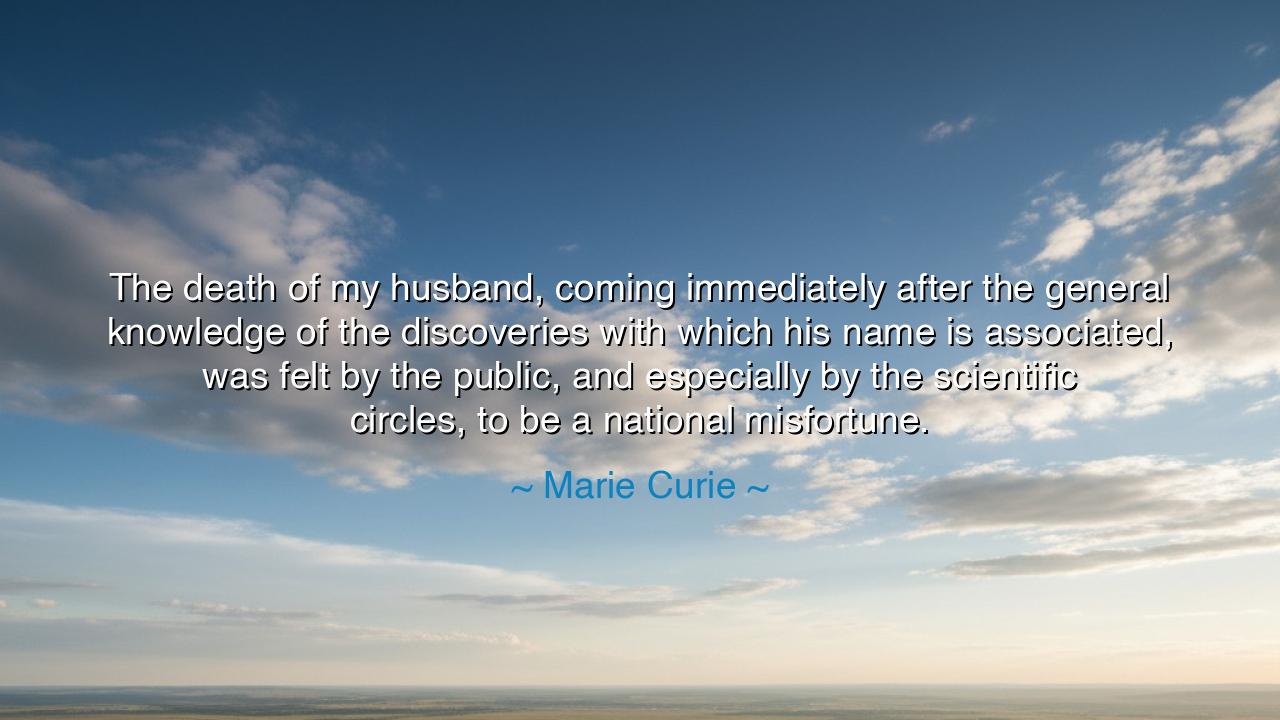
The death of my husband, coming immediately after the general
The death of my husband, coming immediately after the general knowledge of the discoveries with which his name is associated, was felt by the public, and especially by the scientific circles, to be a national misfortune.






“The death of my husband, coming immediately after the general knowledge of the discoveries with which his name is associated, was felt by the public, and especially by the scientific circles, to be a national misfortune.” — thus spoke Marie Curie, the luminous mind who gave humanity the gift of radioactivity, and who, through her words, revealed not only the pain of personal loss but the deeper sorrow of the world’s loss of genius. In this solemn reflection, Curie mourns not only her beloved Pierre, but the extinguishing of a brilliant flame whose light had just begun to shine upon the earth. Her words carry the tone of both widow and witness — one who has felt the intimate wound of love and the vast wound of civilization itself.
When Marie Curie wrote these lines, the year was 1906, and the world had only begun to grasp the magnitude of what she and her husband had achieved. Together, they had discovered polonium and radium, substances that revealed to humankind the hidden energy pulsing at the heart of matter itself. Their work had opened the door to modern physics, to medicine, and to a new understanding of nature’s invisible forces. And yet, just as the light of their discovery began to dawn, death struck suddenly. Pierre Curie, struck down by a carriage on the streets of Paris, was lost in an instant. The scientific world was stunned — and Marie, who had shared not only his work but his soul, was left to carry the torch alone.
In her statement, one can hear the voice of the ancients — the voice that laments not merely a man’s death, but the fall of a great star in the sky of human progress. The Greeks would have said that such a man was favored by the gods, and that his passing was not only a tragedy for his kin but a misfortune for the polis, the whole community. So too did France mourn Pierre Curie — not as one man, but as the embodiment of human inquiry, of courage in the pursuit of truth. His death was “a national misfortune,” because through him, the people had seen what greatness could be: a life dedicated not to conquest or wealth, but to the patient unveiling of the universe’s mysteries.
Yet Marie’s words, though sorrowful, are not only elegy — they are testimony. For even as she grieved, she did not retreat into silence. Instead, she chose the path of continuation. She returned to the laboratory, took up her husband’s chair at the Sorbonne — the first woman ever to do so — and pressed forward with their research. It was as though she understood what the ancients taught: that when a great soul falls, another must rise to carry the fire forward. Her grief became her strength; her love transformed into endurance. Through her, Pierre’s spirit continued to live — not as memory, but as work.
In this, there is a lesson that transcends science. The wise know that death does not end a legacy; it transfers it. The death of one visionary becomes the birth of responsibility in those who remain. Marie Curie’s resolve mirrors that of countless figures through history who turned loss into creation. When Alexander the Great died, his generals carried his dream of empire beyond the limits of his vision. When Socrates drank the hemlock, his disciple Plato ensured that the voice of philosophy would never fade. And when Pierre Curie fell, Marie transformed her grief into discovery, ultimately earning two Nobel Prizes and lighting the way for generations of scientists to come.
But in her humility, Curie’s quote also reveals the burden of greatness. She does not boast of glory or triumph. Instead, she acknowledges the human cost of progress — the loneliness of the one who remains when the other has gone. Behind her calm words lies the universal truth that genius, though it lifts humanity, often exacts a personal price. The world may celebrate the discovery, but it rarely sees the heartbreak that lies beneath it. Thus, her reflection reminds us that even those who change the world are still bound by the frailty of human love and loss.
Therefore, my listener, take this wisdom to heart: honor the living while they still labor among you, for greatness is always mortal, and every light, no matter how bright, will one day dim. Do not wait for the fall of a great soul to recognize its value. And when death comes — as it must to all — remember that the measure of a life is not its length, but its impact. Carry forward the flames left to you by those who have gone before: the courage of pioneers, the patience of thinkers, the compassion of dreamers. For as Marie Curie showed, love and loss, when joined with purpose, can outshine even death. And in that union of grief and creation, humanity moves ever closer to the divine.






AAdministratorAdministrator
Welcome, honored guests. Please leave a comment, we will respond soon